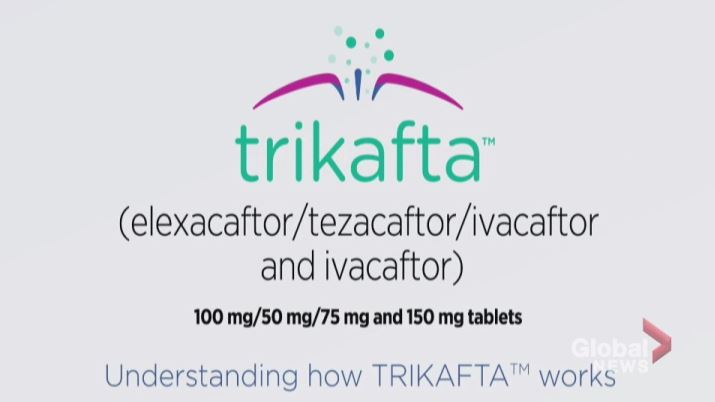Stephanie Whaley’s 14-year-old daughter Ella had a zest for life and adventure. Her mom said she loved to surf in Hawaii, and zipline with her grandmother in Whistler.

But one breathtaking diagnosis has changed everything.
“She had a really rough first four or five years,” Whaley told Global News one afternoon. Her daughter was too sick to join the interview.
“Constantly sick, in and out of the hospital, had trouble gaining weight … it’s a lot of she just ‘can’t breathe.’ She can’t breathe in, and she can’t breathe out a full amount of breath.”
Ella was diagnosed with Cystic Fibrosis, a debilitating genetic disease that causes severe damage to the lungs. For Ella, it’s meant days full of heavy-duty antibiotics, IV injections, PICC lines, and round-the-clock care.
“In the last two years, she’s become a different person because of this disease,” Whaley said, wiping away tears. “In March, she tried to take her life because she said, living with cystic fibrosis is not living — it’s surviving the life she doesn’t want to live.”
But hope came in the form of a new, groundbreaking treatment a few years ago, Trikafta. Approved by Health Canada this past June, it’s been shown to increase lung function, potentially treating up to 90 per cent of Canadians with CF.
Whaley said it would be a game-changer for her daughter.
“It’ll help her breathe,” Whaley said.

Get breaking National news
“It’s a right that you’re given as a human, to be able to breathe.”
But a $300,000 price tag per patient for a year’s supply of Trikafta, put the drug out of reach. Then in September, there was a glimmer of hope. Ontario said it would cover the cost of Trikafta for eligible patients. But there was a catch.
“Unfortunately, if you have your own private insurance, you have to go through them first,” Whaley said.
Because her family has insurance through their workplaces, the province says OHIP will not cover the costs.
Global News reached out to both insurers for comment, but neither responded to the requests.
“So in essence, they’ve put a price on my child and other CF-ers lives,” Whaley said. “I understand it’s a very high-cost medication, but there are only 4,300 Canadians with cystic fibrosis. Why do they have to struggle to get access, just because their parents or themselves have private insurance?”
For Whaley, it means having to fork out $700 per month — an added burden on top of many other expenses.
“It is a high burden disease,” said Kim Steele, director of government and community relations for Cystic Fibrosis Canada.
“The financial cost of the many, many medications — sometimes up to a hundred pills a day — really adds up,” Steele said.
Governments offer some assistance to cover the cost of some medications known as “symptom management medicines,” but Steele said those aren’t widely covered, either.
“So when you put on a game-changing therapy like Trikafta onto that list of drugs, the cost becomes really out of reach for many people.”
Cystic Fibrosis Canada says the province needs to help families to afford these life-changing treatments — families that are falling through the cracks.
Steele said one of the options that is being explored is a nationwide strategy for drugs for rare diseases. The strategy would ensure that this class of drugs is affordable and quickly available to the people who need them.
“So we need that bulk purchasing power to help drive down the cost of the drugs so that our payers, our insurers — public or private — can provide the drugs in a way that does not cripple a family financially.”
For Whaley, as she watches her daughter struggle, she said she just wants access to a drug that shows so much promise and hope.
“I honestly feel like I’m begging for my kid’s life and it’s a horrible feeling,” she said. “My fear is that this road is only going to get harder, and I don’t know that she has anything left in her to keep going.”




















Comments